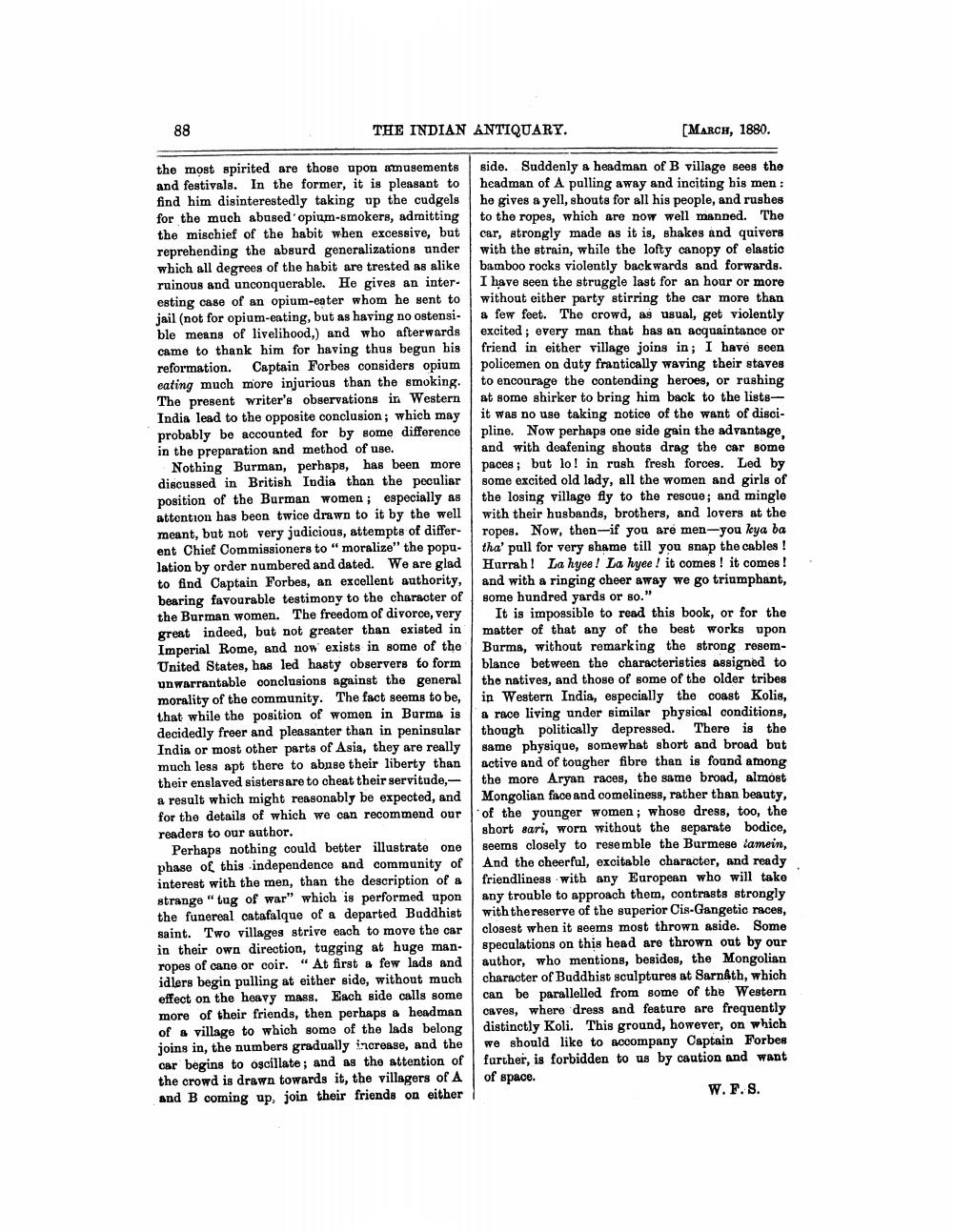________________
88
THE INDIAN ANTIQUARY.
[MARCH, 1880.
the most spirited are those upon amusements side. Suddenly a headman of B village sees the and festivals. In the former, it is pleasant to headman of A palling away and inciting his men: find him disinterestedly taking up the cudgels he gives a yell, shouts for all his people, and rushes for the much abased'opium-smokers, admitting to the ropes, which are now well manned. The the mischief of the habit when excessive, but car, strongly made as it is, shakes and quivers reprehending the absurd generalizations under with the strain, while the lofty canopy of elastic which all degrees of the habit are trested as alike bamboo rocks violently backwards and forwards. ruinous and unconquerable. He gives an inter- | I have seen the struggle last for an hour or more esting case of an opium-eater whom he sent to without either party stirring the car more than jail (not for opium-eating, but as having no ostensi a few feet. The crowd, as usual, get violently ble means of livelihood,) and who afterwards excited; overy man that has an acquaintance or came to thank him for having thus begun his friend in either village joins in; I have seen reformation. Captain Forbes considers opium policemen on duty frantically waving their staves eating much more injurious than the smoking. to encourage the contending heroes, or rushing The present writer's observations in Western at some shirker to bring him back to the listeIndia lead to the opposite conclusion; which may it was no use taking notice of the want of disciprobably be accounted for by some difference pline. Now perhaps one side gain the advantage in the preparation and method of use.
and with deafening shouts drag the car some Nothing Burman, perhaps, has been more paces; but lo! in rush fresh forces. Led by discussed in British India than the peculiar some excited old lady, all the women and girls of position of the Burman women; especially as the losing village fly to the rescue; and mingle attention has been twice drawn to it by the well with their husbands, brothers, and lovers at the meant, but not very judicious, attempts of differ- ropes. Now, then--if you are men--you kya ba ent Chief Commissioners to "moralize" the popu. tha' pull for very shame till you snap the cables ! lation by order numbered and dated. We are glad Hurrah! La hyee! La hyee ! it comes ! it comes ! to find Captain Forbes, an excellent authority, and with a ringing cheer away we go triumphant, bearing favourable testimony to the character of some hundred yards or so." the Burman women. The freedom of divorce, very It is impossible to read this book, or for the great indeed, but not greater than existed in matter of that any of the best works upon Imperial Rome, and now exists in some of the Burms, without remarking the strong resomUnited States, has led hasty observers to form blance between the characteristies assigned to unwarrantable conclusions against the general the natives, and those of some of the older tribes morality of the community. The fact seems to be, in Western India, especially the coast Kolis, that while the position of women in Burma is a race living under similar physical conditions, decidedly freer and pleasanter than in peninsular though politically depressed. There is the India or most other parts of Asia, they are really same physique, somewhat short and broad but much less apt there to abuse their liberty than active and of tougher fibre than is found among their enslaved sisters are to cheat their servitude, the more Aryan races, the same broad, almost a result which might reasonably be expected, and Mongolian face and comeliness, rather than beauty, for the details of which we can recommend our J. of the younger women; whose dress, too, the readers to our author.
sbort sari, worn without the separate bodice, Perhaps nothing could better illustrate one seems closely to resemble the Burmese lamein, phase of this independence and community of And the cheerful, excitable character, and ready interest with the men, than the description of a friendliness with any European who will take strange " tug of war" which is performed upon any trouble to approach them, contrasts strongly the funereal catafalque of a departed Buddhist with the reserve of the superior Cis-Gangetic races, saint. Two villages strive each to move the car closest when it seems most thrown aside. Some in their own direction, tugging at huge man. speculations on this head are thrown out by our ropes of cane or coir. "At first a few lads and author, who mentions, besides, the Mongolian idlers begin pulling at either side, without much character of Buddhist sculptures at Sarnath, which effect on the heavy mass. Each side calls some can be parallelled from some of the Western more of their friends, then perhaps a headman caves, where dress and feature are frequently of a village to which some of the lads belong distinctly Koli. This ground, however, on which joins in, the numbers gradually increase, and the we should like to accompany Captain Forbes car begins to oscillate; and as the attention of further, is forbidden to us by caution and want the crowd is drawn towards it, the villagers of A of space. and B coming up, join their friends on either
W.F.S.




